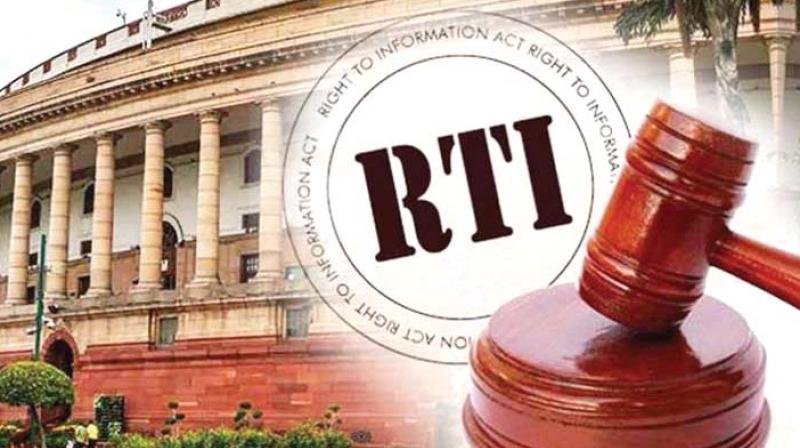Effectiveness of RTI lies with enforcers
Centre, States are not following rules in appointment of commissioners.

Lot of discussions have been going on about the recent RTI Act Amendment Bill. Since the Bill was passed in the Lok Sabha and Rajya Sabha, it has become the law of the land. At this juncture, let us examine how the RTI Act can be utilised even with the recent amendment. There are clear directions in the Supreme Court judgment — Namit Sharma Vs Union of India SC Judgment No.210/2012 and the review order of the Supreme Court Review Petition (C) No. 2309 of 2012 in Writ Petition (C) No. 210 of 2012 (Under Article 32 of the Constitution of India).
The SC judgment states: “The appointment of the Information Commissioners at both levels should be made from amongst the persons empanelled by the DoPT in the case of Centre and the concerned ministry in the case of a State. The panel has to be prepared upon due advertisement and on a rational basis as afore- recorded.” The panel so prepared by the DoPT or the concerned ministry ought to be placed before the High-powered Committee in terms of Section 12(3), for final recommendation to the President of India. Needless to repeat that the High-Powered Committee at the Centre and the State levels is expected to adopt a fair and transparent method of recommending the names for appointment to the competent authority.”
Again, the names proposed shall be three times of the existing vacancies. And “The selection process should be commenced at least three months prior to the occurrence of the vacancy.”
These are the broad guidelines issued by the Supreme Court in the above judgment for selection of Central and State Information Commissioners. However, the Central government and none of the State Governments are following these rules. In the case of Kerala, out of the existing five commissioners, all except one are political appointments. Another commissioner’s appointment was not approved by the Governor, because of widespread allegation of various criminal cases against him. A petition challenging the appointment of four ICs is already pending with the High Court of Kerala.
The State Information Commi-ssion is now functioning with one short of the actual approved number. As on May 31, 2019, 11,388 Appeal petitions and complaint petitions are pending. Out of the above, 77 cases are related to the year 2012, 456 cases related to the year 2013, 1,178 cases are related to the year 2014, 1,199 cases related to 2015, 1,121 for the year 2016, 2,173 cases for the year 2017 and 2,204 related to the year 2018.
Except the long pending cases, nowadays the appeals are disposed of within one to two years. The Chief Information Commissioner has disposed of 3,069 cases from January 2018 till 31.05.2019. Sri. K.L. Vivekandan IC disposed of 1,607 cases during the period, Sri. Somantha Pillai IC, disposed of 1,833 cases, Smt S. Sreelatha IC cleared 959 cases and Sri. K.V. Sudhakaran IC cleared 954 cases.
Nowadays inordinate delay is observed in issue of orders related to the hearing conducted in respect of certain Information Commissioners.
For example, a hearing (APNo.1644/2018) conducted on 30.01.2019, the order was issued only on 11.06.2019, after four months. The inordinate delay in issue of orders after completion of the hearing, defeats the sanctity of the matter. The Act stipulates that State Public Information Officer should attend the second appeal hearing. But there are cases, wherein section assistant is permitted to attend the hearing instead of PIO, thereby making a mockery of the Act. In spite of clear violations by the SPIO, some of the information commissioners are reluctant to call for explanations from the delinquent PIOs and in awarding penalty and punishment as per section 20(1) & (2) of the Act.
Online filing of the RTI Application and First Appeal though implemented in various other states, our state has still not implemented it. Only Second Appeal can now be filed with the State Information Commission. A Writ Petition is pending regarding the filing of RTI application in our state. The overall performance of the State Information Commission is to be improved.
So, even if the period of the Information Commissioners are reduced from the existing five year tenure to lesser period and the salary also reduced, as most of the incumbents are ineligible persons, all concerned should ensure that the existing selection process is meticulously followed and wherever deviations are noticed, even court intervention to be resorted to, so that, only most eligible persons are selected for the relevant posts.
Removal of the information commissioners at present involves very cumbersome process. In the case of one of the Kerala State Information Commissioner, who was suspended by the Governor for gross misconduct, nothing materialised, and he completed his reaming full tenure under suspension, and retired with full back wages.
The appointments of all Information Commissioners both in the centre and various States, are done in a fair and transparent method, the reduction in tenure and salaries may not be a deterrent for those Information Commissioners who are committed to their work.
The Centre and States should take urgent steps to fill up all the existing vacancies, so that, the time taken for disposal of the appeals filed, which now varies from nine months to one year in the case of Central Information Commission, and to two or more years in the case of Kerala State Information Commission, can be reduced to a considerable extent.

